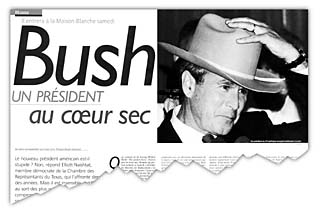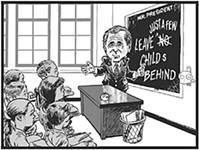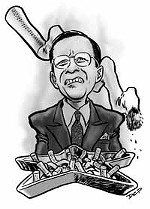Naked City
The Heart of the Matter
By Louis Dubose, Fri., Feb. 23, 2001

Un Homme de Compromis? Not hardly.
It's no secret that the nagging question about George W. Bush has to do with intellectual rather than physical vitality. For a guy in his mid-50s, the president is in great physical condition. As governor, he was a regular on the Town Lake jogging trail; as president, he jogged through his first rite of passage as the Leader of the Free World. When a would-be assassin was shot outside the White House lawn early this month, Bush -- according to the White House press office -- was indoors working out on exercise equipment that had just arrived.
In mid-January, the French magazine Le Nouvel Observateur asked the intelligence question about Bush and came to a conclusion that had more to do with cardiology than psychometrics. "Le nouveau président américain est-il stupide?": Is the new American president stupid? When Nouvel Observateur's American correspondent Philippe Boulet-Gercourt posed that question to Austin State Rep. Elliott Naishtat, he got a resounding non. Naishtat offered instead that Bush is insensitive and indifferent to the plight of the most vulnerable residents of the state he governed for six years. The diagnosis, according to the French weekly, is "a dry heart."
This diagnosis is entirely based on an interview with Naishtat, in which he covers ground familiar to Chronicle readers: Bush's position on welfare, in which he fought for Draconian measures like full-family sanctions when mothers were caught violating the law; his futile fight to limit enrollment in the Children's Health Insurance Program; his opposition to even the most minor reforms in the Board of Pardons and Paroles' death penalty hearings. "Will Bush bring a spirit of compromise to Washington?" Naishtat was asked. He replied that Bush refused to compromise on health insurance for children, welfare, the death penalty, and a number of other issues, and hardly seemed like a man of compromise.
In fairness to Bush, Naishtat did describe him as sympathetic, charming, and engaging on a personal level, and implied that Bush is a better person than the politician who gave himself over to the Christian right, which could make or break his campaign. And in fairness to Naishtat, he is one of a half-dozen Democratic legislators who openly criticized Bush's legislative agenda during the presidential campaign. (Others included Austin Rep. Glen Maxey, Houston Rep. Garnet Coleman, and Sen. Mario Gallegos of Galena Park.) Once these few legislators got into the journalistic food chain -- where critics from Texas were, as former Speaker of the House Gib Lewis would have said "far and few between" -- calls from the foreign press were frequent. Naishtat said he assumed he would be one of several sources quoted in an article on Bush. Instead, most of the article is a Q&A, at the end of which Boulet-Gercourt concludes that Bush's weakness is not in his head but in his heart.
Got something to say on the subject? Send a letter to the editor.








